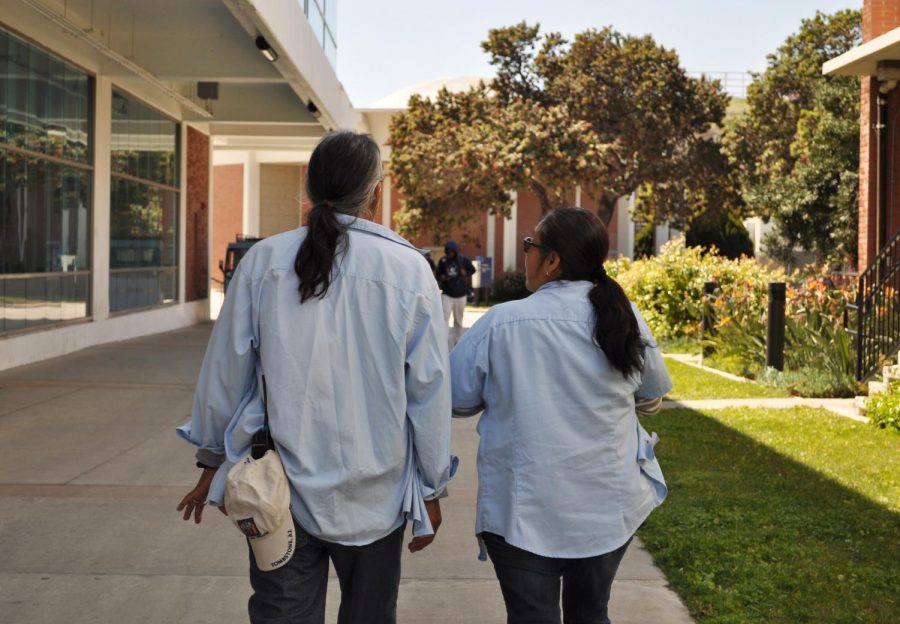Meet the married couple, a custodian and a groundskeeper, who tend the campus grounds of El Camino College
El Camino College is a campus where one can not only acquire knowledge, but also do so on well-kept grounds. This is a story that gives voice to the individuals who help keep our campus in shape who may otherwise go under appreciated and/or taken for granted.
May 30, 2018
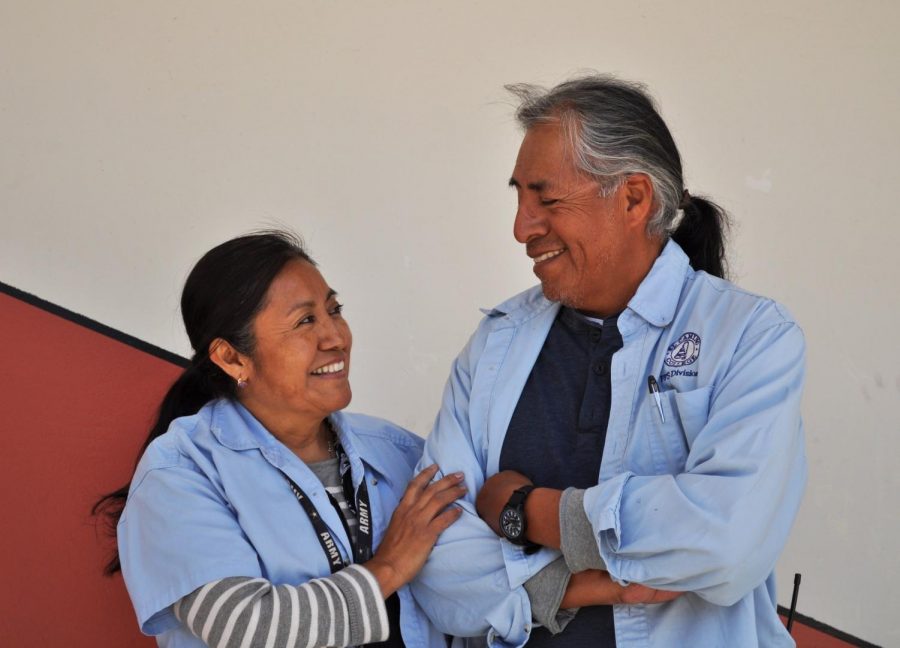
Rough, calloused hands wrap their digits along the wheel of an azure golf cart. As it breezes by and its revving engine gets louder, a grey ponytail can be seen flowing out from the back of the cart.
The person to whom it belongs is wearing a dark blue uniform, tinted glasses, and a black, fitted hat. The ends of his pants are stained with dirt, and an assortment of tools can be seen rocking back and forth on the cart.
The driver of the cart is Gardena resident Fernando Vicente, 56, who is Groundskeeper 1 at El Camino College. Like every day, the Oaxaca, Mexico native is on his way to the Life Science building, the area to which he has been assigned.
“We’re all assigned an area independently,” Fernando says.
The custodian and staff are all in charge of a specific section on campus and must maintain that area until the end of the day. Then, the night custodians take over.
The areas, however, vary in terms of workload. Some custodial staff members are assigned a larger or more difficult section to tend to.
“Everybody has a run, a particular area. I don’t feel they’re distributed easily. Some of them have easy runs. For me? It’s huge,” Fernando says.
“They hired a new guy two weeks ago. He does all the cleaning around [the Life Science area] there now. Before that, I spent 66 percent of the day cleaning, weeding and trimming mainly the north side of the Cafe Camino,” Fernando says. “So that’s going to give me a lot more time to concentrate on gardening. I just like to do more gardening.”
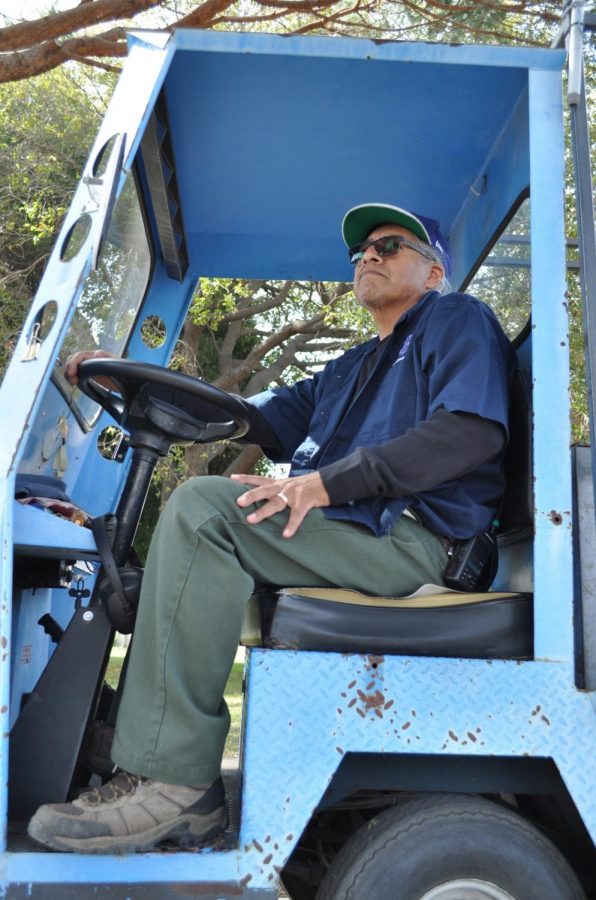
His love for gardening first started when he was attending Gardena High School.
“I took a vocational agriculture class and I really liked it. In my senior year, a student owned a nursery in Oregon and asked the teacher if anyone was interested in working in it. I said ‘yeah, sure’,” Fernando says.
He went out for the summer to learn how to bud trees, then went to Pierce College. During his first semester, he wanted to major in fruit science but later dropped out to work.
Fernando had started his own gardening business, Pro-Verde Grounds Maintenance, 20 years before applying for a job at El Camino. He and his team worked around the clock to do the same basic gardening — trimming, weeding, and maintaining — that he is doing now.
“I worked all through the South Bay to San Pedro,” Fernando says.
In 1996, Fernando left the business and sought out several different jobs.
“I applied to [work at] Cal State Long Beach, Pasadena… When I applied [to El Camino] I wasn’t really looking. I really only applied here on a whim,” Fernando says with a light chuckle.
When he first started working, he was assigned to the old Administration building before being sent to the athletic area where he was in charge of both the baseball and softball fields when they had a garden in 1997.
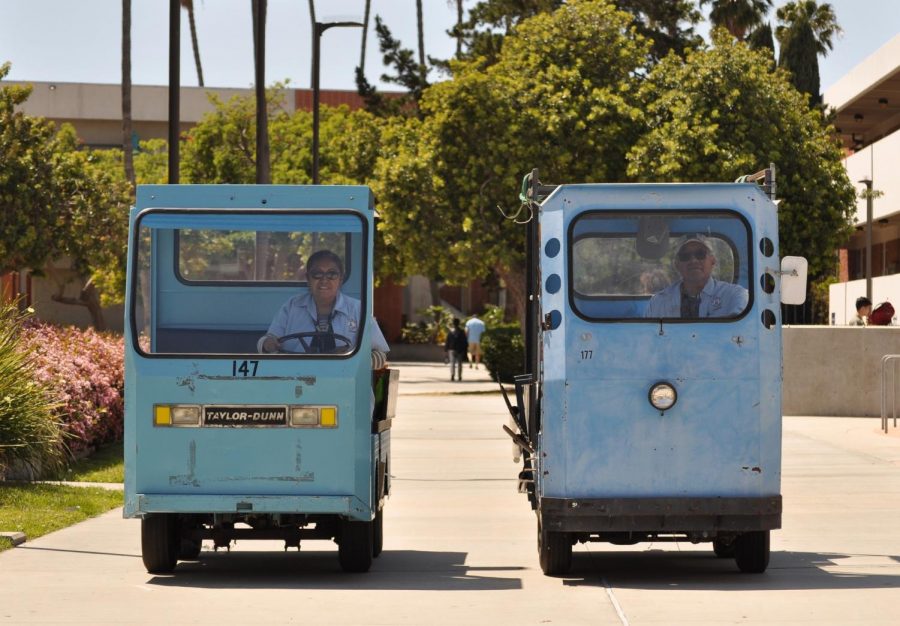
It was not until 2008 that he encouraged his wife, María de Rocio Vicente, 50, to work for El Camino College as a custodian.
She is from Mexico City, Mexico and came to the United States later in her adult life. She wears tinted glasses and has straight black hair that goes past her shoulders. The navy blue uniform she wears is labeled “FPS Division” on its upper-left chest pocket.
Fernando and Rocio have been married for 25 years and had recently had a church wedding on Saturday, March 11. They have three daughters. Cynthia, 27; Nightsky, 20; and Newbiae, 16.
Nightsky attends El Camino College, but Fernando says she has chosen to keep her major a secret from him and Rocio.
In contrast to her husband, who came to the United States in December of 1974 from Mexico City at the age of 13 and was able to learn English through the public school system, Rocio says she has always struggled with English.
“I had come from Mexico with a degree in design, but it didn’t mean much here,” Rocio says in Spanish. “I can speak English, but I’m much more comfortable with Spanish.”
Rocio wants to learn English in the summer and her motivation to do so stems from wanting to understand her daughters and her coworkers. She often feels out of the loop during meetings as well.
She and three other custodians rotate around campus to clean specific parts of the seven main buildings. Rocio’s job is to clean the women’s bathroom in each building.
“It takes around two hours to clean them all. Sometimes longer if the restrooms are full. Sometimes it takes up to two hours on one building alone,” Rocio says.
She says the custodians who work at night are more pressured to clean up after everyone.
“They do everything,” Rocio says. However, Rocio says she loves her job nonetheless.
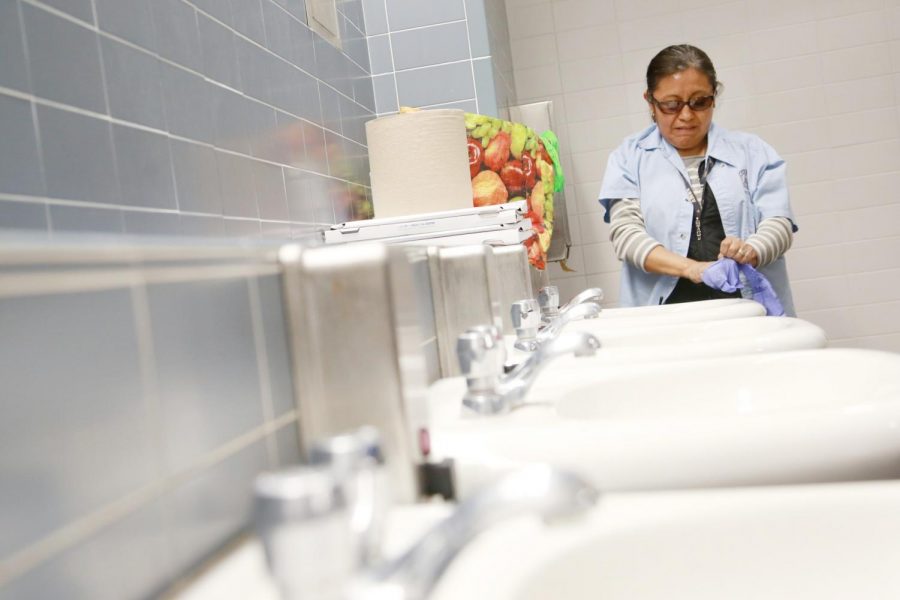
The night custodians are in charge of more than one specific area and have to constantly rotate around campus. The workload has been too much in the past, for both the daytime custodians and the nighttime custodians, she says.
Fernando says he has had trouble with management in the past, saying that sometimes there was too big of a workload for him.
“The hardest part of my day is when I have to blow down [leaves]. I have to carry a backpack that weighs 25 pounds. And when I blow the leaves it takes around an hour and fifteen minutes. That’s the hardest part, physically,” Fernando says.
He says that he has had to stand up for his rights in the past because of problems he had with the workload he was given, but what he does now is just fine to him.
“A lot of managers have unattainable expectations from their employees,” Fernando says. “Some employees get to be a manager or supervisor. They go up on a power trip. It’s been my experience that both the union that represents the employees and the district just kind of let it go. Out in the real world, when you work for a private company, it’s different.”
The frustration that Fernando says he has is the feeling that managers don’t want to deal with anything. He says they would rather avoid a particular problem so they don’t have to deal with it and he believes this is true for the staff campus-wide.
“A lot of people have the mentality of ‘don’t make any waves’. That’s the way it’s always been and the way it’s going to be. I ask legitimate questions and it’s what people don’t want to hear,” Fernando says.
